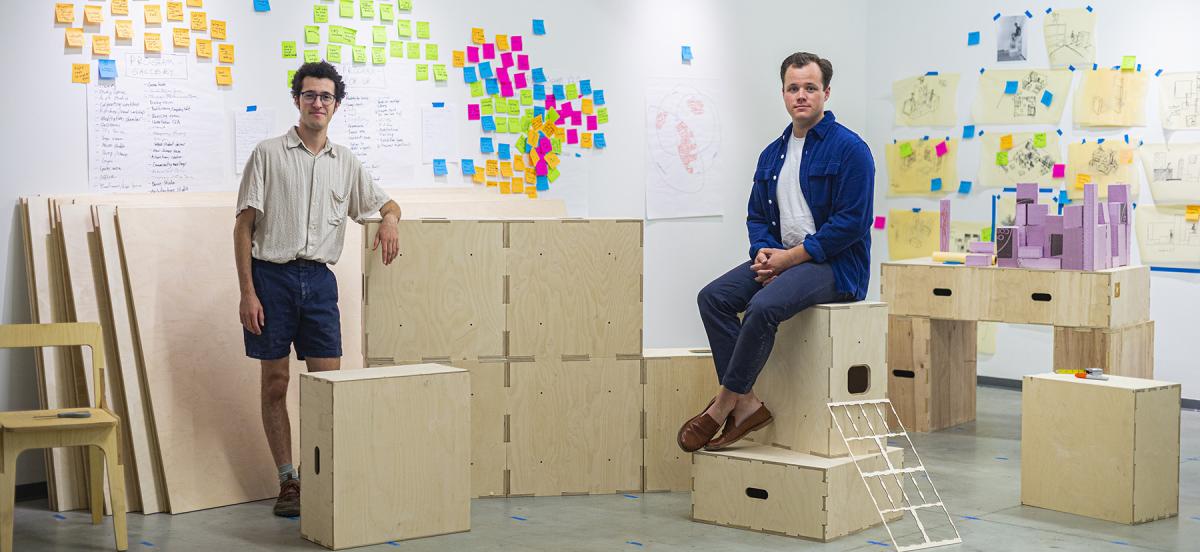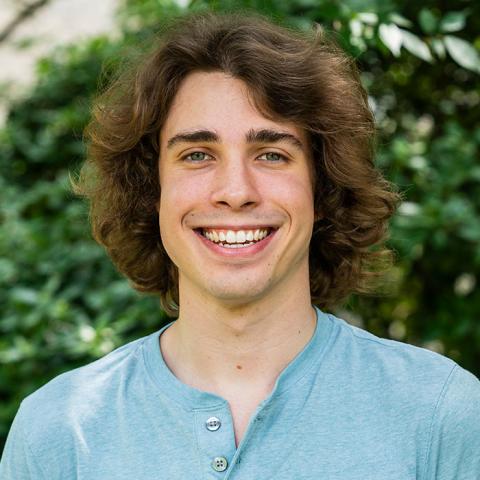Summer Centered: Open House Team Builds Open-Source Architecture

The Open House team, (from left) Nicky Rhodes '19 and Austin Huber '19, with some prototype boxels. Photo by Patrick Montero.
Details
Austin Huber ’19 and Nicky Rhodes ’19 are taking advantage of the burgeoning makerspace movement to build a sustainable, open-source design platform that allows customers to fully personalize their spaces.
Growth and structure of cities majors Austin Huber ’19 and Nicky Rhodes ’19 have a vision: they want to fundamentally change how people imagine furniture and housing. As one of the two student groups in this year’s Haverford Innovations Program (HIP) Summer Incubator—a VCAM-centered program in its second year that provides funding to students with entrepreneurial ideas—Rhodes and Huber have created Open House, an open-source, modular design program intended to increase access to customizable, sustainable structures, from furniture to buildings.
“Open House is a collaborative design system that employs accessible fabrication technologies to produce sustainable building modules for creative and versatile structures,” said Huber.
The premise is simple: the pair has created a series of digital templates for assemblable, modular building blocks. Customers can download these templates, edit them, take them to a local makerspace—increasingly common community studios featuring 3D-printers and CNC-routers—and use the templates to cut the necessary building components from plywood. They can then take these components home and assemble them with nothing but a rubber mallet into the structures of their dreams.
All of Open House is made possible by these makerspaces and the degree of personalization and access that they grant customers. Rhodes and Huber recognize this and conceived of Open House as a radical way to use these makerspaces to give people and communities agency over how their furniture is sourced and designed—ultimately allowing people to truly make the spaces they inhabit.
“Shaped by today’s culture of connectivity, Open House harnesses recent revolutions in communication, design, and production, manifested in widespread accessibility to makerspaces and collaborative online idea-sharing platforms,” said Rhodes. “We seek to leverage this phenomenon to generate an ethical building system that empowers individuals and communities, stimulates imaginative design, and addresses our environmental reality.”
In particular, the HIP Innovation Incubator allowed the Open House team to make full usage of VCAM and its Maker Arts Space to prototype their designs and understand what it would be like for a customer to go through the process of constructing Open House furniture from start to finish. They were aided in this endeavor by HIP Program Manager Shayna Nickel and VCAM Maker Arts Space Technician Kent Watson.
“This year, the Open House team, with a focus on modularity, embraced the opportunity in using the Maker Arts Space to engage in designing and constructing a fabricated product,” said Nickel. “The team embraced the opportunity of working within VCAM, collaborating with the Maker Arts Space and the Hurford Center to produce an installation of their work in a VCAM Create Space and elsewhere in the building.”
The fundamental premise of Open House hinges on its basic design unit—the boxel.
“The boxel is a building block for the Information Age, as it has both physical and digital counterparts,” said Huber.
“With countless applications and reconfigurations, the physical boxel is made entirely of plywood components cut by a CNC-router, a standard machine at many makerspaces,” he continued. “The online Repository contains a virtual representation of each module that can be browsed, shared, edited, and fabricated with the click of a mouse.”
The boxel allows for Open House’s integral modularity: it can be customized to different shapes and sizes and fitted with different types of shelving and lighting fixtures to meet the needs of any individual or space.

Open House is not the first collaboration between Huber and Rhodes. During the 2017-2018 academic year, the pair was awarded funding to design a bike shelter/blue bus stop by the North Dorms. They emphasized sustainability and Quaker craftsmanship in their design, and the pair now cite the experience of designing and building the structure as one of the most formative ways Haverford prepared them to launch Open House.
“At the end of our sophomore year, Austin and I received funding and institutional support to design and lead the construction of the new North Dorms Bus Stop & Bike Shelter,” said Rhodes. “This experience proved to me that Haverford sincerely cares about students learning in extraordinarily deep and integrative ways, and that the College has a profound trust in us to achieve our goals, no matter how ambitious.
“I feel that completing the North Dorms Bus Stop through the Facilities Fund was the most valuable experience I had at Haverford,” added Huber. “The yearlong design and construction process exposed us to many of the realities that we will face in our careers.”
Open House is a particularly special project because of the way it fundamentally relies on a traditional Haverfordian sense of community, while simultaneously showcasing how VCAM—one of Haverford’s newest facilities—has expanded the ways that Haverford students can come together to work on large-scale, visionary projects. To Nickel, this is what HIP is all about—fostering community through innovation and innovation through community.
“Working with Haverford students and the supporting community, including staff, faculty, and alumni is such a pleasure,” said Nickel. “Teams that come into the Incubator are driven, focused, and eager to dive into work and learning.”
After this summer, Huber and Rhodes are hoping to turn Open House into a business they can continue to run together. Their next stop is the Philadelphia design festival PARK(ing) Day 2019, where dozens of architecture and design firms are given one parking space in Center City to set up a temporary installation showcasing their ideas and designs. The Open House parklet will be located on the 800 block of Chestnut Street on Friday, September 20th.
Open House designs can also be seen on show in the VCAM Lower Create Space until October 11 as a part of their installation UNBOXED. Visit Open House on Instagram @open_house_org, and watch a video made by DocuLab fellow Edward Ogborn ‘19 about Open House here.
“Summer Centered” is a series exploring our students’ Center-funded summer work.




